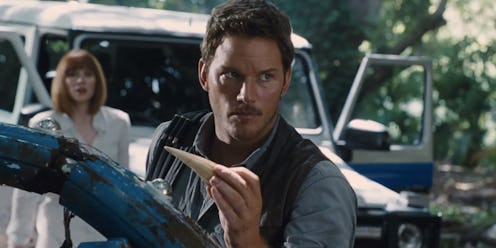Entertainment
How 'Jurassic World' Broke A World Record

The months of conversation leading up to Jurassic World were stacked heavily with high-volume conversation about the film to come. People debated over the CGI, Chris Pratt's biker gang of raptor companions, gender politics, and the ever-important question of why people keep going to a dinosaur theme park after the events of the first three films. Armed with these and other questions, it appears even the most dubious of audience members wouldn't rest until they were answered. How best to have them answered? By heading to see Jurassic World on opening night. Thus, it comes as absolutely no surprise to even the biggest dinosaur hater that Jurassic World made $511 million in a single weekend.
Of course, a film’s opening performance has more to do with brand attraction that it does with the picture’s genuine quality. While the last two movies to hold the record, Harry Potter and the Half-Blood Prince (which took $483.2 million in 2011) and Harry Potter and the Deathly Hallows – Part 2 ($394 million in 2009), laid claim to a previous legacy of amazing films that made the audience pretty sure they'd be getting their money's worth, this has hardly proved a requirement to attract mass audiences worldwide in the past decade and change.
In 2007, Spider-Man 3 opened to box office grandeur of $381.7 million, committing with its peculiar rhythms a retroactive questioning of Sam Raimi’s previous Peter Parker installments. In 2005, Star Wars: Episode III – Revenge of the Sith managed a healthy $303.9 million despite a communal distaste for the first two entries in the Prequel Trilogy. In fact, 2003 was the last time a movie born from true critical admiration nabbed the worldwide opening weekend record: The Lord of the Rings: The Return of the King, which took in $250 million.
Twelve years after the top-grossing conclusion of Peter Jackon’s first turn at Tolkien, we witness the first movie to ever breach $500 million in its opening weekend alone. Despite everything waging against Jurassic World, it managed this colossal intake, and, what’s more, the second biggest domestic gross of all time at $204.6 million. (The Avengers maintains the top spot on that list with $207.4 million.)
Needless to say (due to its lack of precedent), a breach of $500 million is a tremendous order for even the most positively tracking film. So how on earth did Jurassic World hit that mark?
Common among other previous record holders, and among those boasting the highest grossing openers over the course of the past year, is position at the apex of a franchise. Deathly Hallows – Part 2, Revenge of the Sith, and Return of the King were each established as the final chapter of its respective story. In 2014, we saw success in the sweeping time-jump tale X-Men: Days of Future Past, the penultimate Hunger Games film Catching Fire – Part 1, and the introduction of the long awaited Dinobots in Transformers: Age of Extinction. In 2015, mammoth team unions in Avengers: Age of Ultron and Furious 7 have made for weekend winners.
But it’s more than just “big” that rings consistent among this lot. Paradoxically, just about every film mentioned embraces some return to the fundamentals of its franchise, or the world therein. In 2005, Revenge of the Sith bridges the gap between the Prequels and the Original Trilogy. In 2007, Spider-Man 3 fended Parker against his long promised foe Harry Osborne. In 2011: Harry vs. Volemort. In 2014: a reset button on the X-Men misgivings of franchise yore, roping back in everyone and everything we loved from day one, and, again, Dinobots. In 2015: all Avengers the entire Fast and Furious gang present and accounted for, rallying against an effectively faceless evil as an opportunity for full-team action sequences.
Jurassic World clearly has the former characteristic going for it — the title alone evokes a sense of Armageddon with this bout of bigger, stronger, more vicious dinosaur creations. But it also vies for an identity in tandem with the pilgrim of its journey. It doesn’t only want to exist as a “new” Jurassic Park, but as a direct response to the 1993 classic. Its characters all pose as funhouse mirror images of Jurassic Park heroes and villains. Its conversations surround its world’s (and its own, as a film) existence in a post-’93 era. In truth, Jurassic World has fundament as presently on its mind than it does dinosaur carnage. And, in an age that cherishes nostalgia as much as it does senseless action, that’s the perfect recipe for a $511 opening weekend. With all that considered, this is really no surprise.
Images: Universal; Warner Bros (2); Disney